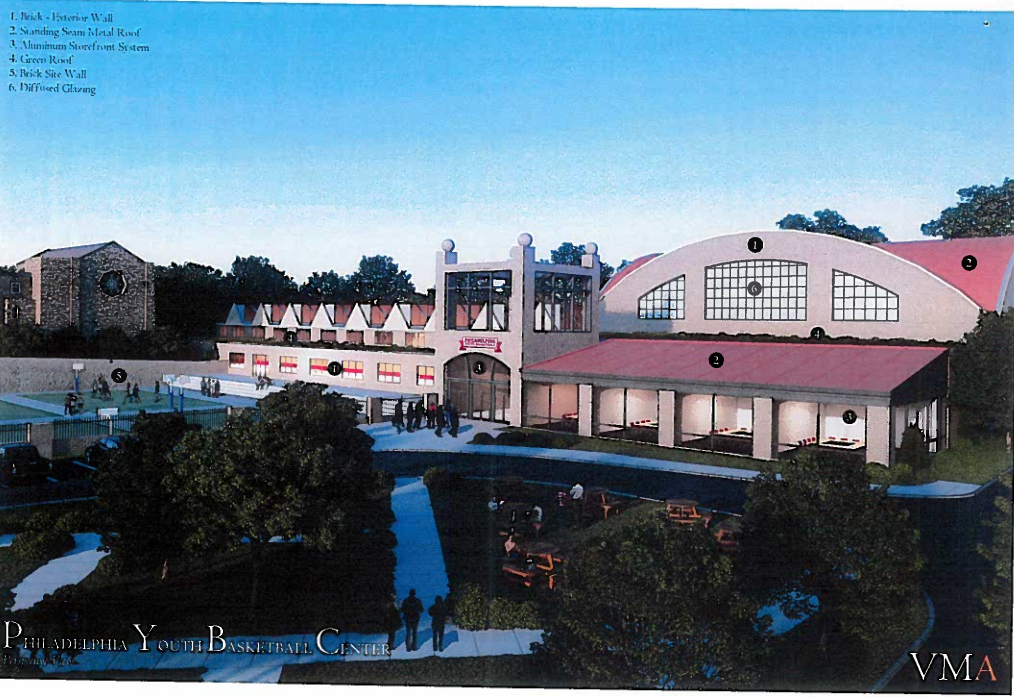First step in plan to redevelop Logan Triangle: A $25m basketball complex

Philadelphia’s Redevelopment Authority has begun the process of transferring the southwest corner of the infamous Logan Triangle into private hands, a long-awaited step forward.
The 36 acres in North Philadelphia west of Roosevelt Boulevard are principally known for the 1,000 houses the city seized through eminent domain in the 1980s. The houses had been built on a creek bed filled with coal ash, and as that insubstantial material washed away the structures sunk to the point where, in some cases, the porches were lower than the steps leading up to them.
In the wake of gas-main explosions that destroyed several homes and convinced city officials the neighborhood was no longer fit for human habitation, the houses were razed. The Logan Triangle is now the largest vacant plot of land in the city, and a magnet for illegal dumping.
Last month, a contractor dumped a load of construction waste there right in front of Councilwoman Cindy Bass and her Trash Task Force. So Bass was especially excited Thursday to get the redevelopment process started by introducing legislation to shift land for the first phase of development to the Goldenberg Group.
“The bill is a transfer of property between the Redevelopment Authority and the entity that will be doing the development for Logan,” she said. “It is long overdue. This is a historic moment for Philadelphia and for the neighbors to finally begin to see this project moving forward.”
On Wednesday, the Redevelopment Authority’s board had approved the Goldenberg Group’s plans to create facilities for Philadelphia Youth Basketball, a nonprofit that proposes a $25 million state-of-the-art facility that would include outdoor and indoor courts, a library, and a computer lab.
Technically, the project will be managed by Logan West Associates LP, which Goldenberg created for the purpose. The company did not respond to numerous interview requests.
What the authority’s board signed off on was an unorthodox deal for the unorthodox site. After an independent fair-market appraisal determined that the costs of making the famously unstable land buildable would exceed the land’s value, the city has agreed to sell it for $1.
“This is a very challenging site because of the cost it’s going to take to make the ground buildable again,” said Gregory Heller, executive director of the Redevelopment Authority. “That cost is going to be in the tens of millions of dollars just to be able to build on this site.”
Assuming City Council passes the bill next week, before its summer recess, the Redevelopment Authority will execute the agreement and transfer the title to Goldenberg Group’s Logan West Associates.
Another unusual aspect of the deal is that the developer can wait two years to take title — substantially longer than the authority usually allows — because so much work must be done at the site before building can actually begin. More than 100 years ago, the original developer simply filled the Wingohocking Creek with coal ash instead of more stable material such as regular soil or rocks. To make the site usable, Goldenberg will need to either construct buildings that can be corkscrewed into the unstable ground or remove the coal ash and replace it with a better base that won’t allow future structures to fall into the earth.
In another unusual twist, the authority is conceiving of the project as a public-private partnership, Heller noted, “because it’s going to take years to carry out this full development project, and because it’s somewhat speculative in terms of future stages.”
“What that means is the public sector is sharing both the risk and the reward of this project with the private developer,” he said.
When the Goldenburg Group takes title of the property, it will have to donate $500,000 into a community fund. Over the life of the project, and for 10 years after its completion, that fund would receive 10 percent of distributable cash, all for use in the surrounding neighborhood.
Future phases of the Logan Triangle redevelopment have not yet been defined, and the Redevelopment Authority expects Goldenberg to come back with plans for the rest of the site in the coming years. The authority’s board and City Council would have to approve those future phases, as well.
For Sandra Harmon, of Nicetown Community Development Corporation, any redevelopment needs to be paired with cleaning up the rest of the site right now. She welcomed Goldenberg’s attention, but said she’d like an update from the company on its plans.
“Right now, it’s really difficult to have a vision when it’s been neglected for so long,” said Harmon, an outreach coordinator with the Nicetown CDC. “But the Philadelphia Youth Basketball venture, I think that’s a good idea.”
WHYY is your source for fact-based, in-depth journalism and information. As a nonprofit organization, we rely on financial support from readers like you. Please give today.




